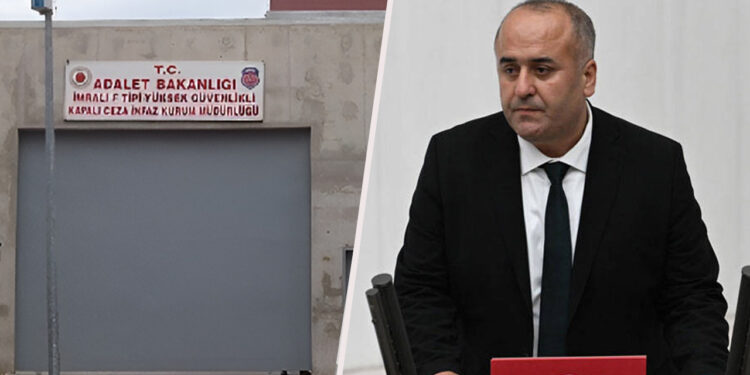Turkey’s pro-Kurdish DEM Party MP Cengiz Çiçek has proposed a parliamentary commission to investigate claims of strict isolation at İmralı Prison, countering the Justice Ministry’s denial of isolation practices.

Pro-Kurdish Peoples’ Equality and Democracy (DEM) Party MP for Istanbul Cengiz Çiçek on Wednesday called for a parliamentary investigation into alleged absolute isolation at Turkey’s İmralı Prison, challenging the Justice Ministry’s claims that there is no such practice.
The MP expressed serious concerns about the conditions in İmralı, highlighting an alleged system of absolute isolation that he argues is being maintained as part of a broader state policy.
“Denial of the Kurdish issue has manifested itself yet again through the approach towards Mr [Abdullah] Öcalan, indicating that the legal order and security policies built on illegality, denial and destruction will be continued, leaving the Kurdish issue unresolved,” said the MP, who is also spokesman for the Peoples’ Democratic Congress, a union of various left-wing political movements. Abdullah Öcalan, leader of the Kurdistan Workers’ Party (PKK), has been in prison since 1999 and has had no contact with the outside world, including his family and his legal team, since March 2021.
Çiçek, responding to the Justice Ministry’s recent denial of isolation practices at İmralı Prison, proposed a motion for parliament to scrutinise and potentially to end the isolation practices there. He pressed for an on-site inspection to ascertain the conditions first-hand.
The MP also highlighted anomalies in the treatment of prisoners, particularly of Öcalan, and described the ministry’s stance as part of a broader policy deepening societal divisions and exacerbating economic, legal and judicial issues across the country.
Çiçek pointed to the Turkish ministry’s evasive answer to his party’s previous inquiries. “Although we specified conditions of a torture system and in particular 38 months of total absence of communication from İmralı [in our inquiry], the ministry’s response has limited the period of assessment to the year 2023,” he explained.
In his proposal, Çiçek stressed the need for immediate action, citing a systemic approach to isolation that affects not just İmralı but reflects broader governance issues. He argued that such policies not only breach individual rights but also hinder Turkey’s democratic development.
The call for transparency and the establishment of a commission comes amid a long-standing debate over the conditions under which Abdullah Öcalan and other inmates are being held, with previous applications for cessation of solitary confinement and reinstatement of family and legal visits ignored, leading to a what is now 38 months of incommunicado detention.








Leave A Comment